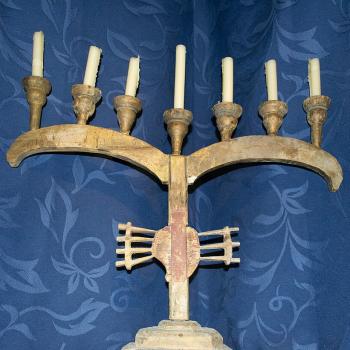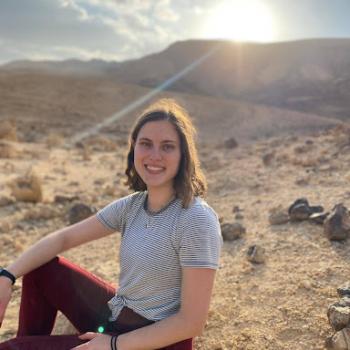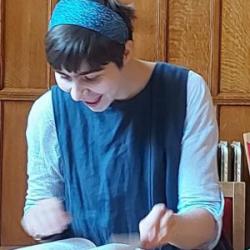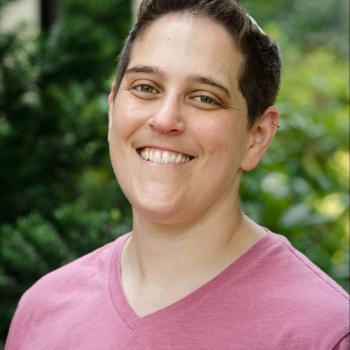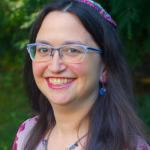Parashat Matot Numbers 30:2-32:42
Parashat Masei Numbers 33:1-36:13
Recently, my oldest child delivered a dvar torah in honor of his high school graduation. He expressed fascination with the cloud of glory resting on the tabernacle and guiding Bnai-Yisrael through the desert, a clear signal showing where to go and when. Why, he wondered, contemplating his imminent launch into the wilderness of “adulting,” does God not provide us a cloud, and how should we navigate without it?
Now, as we conclude the book of Bamidbar with the double parsha Matot-Masei (Numbers 30:2-36:13), Bnai-Yisrael reach their final cloud-of-glory guided stop before entering the promised land to conquer it and begin their next adventure without a cloud to guide them. I am wondering not what to do without a supernatural-guidance-cloud, but what makes us ready to move on without one? What signals to God that the people are prepared for what is next? And how, on a personal scale, can we assure ourselves that we, and our growing children, can handle the challenges of a world filled with uncertainty?
The iteration of Bnai-Yisrael that left Mitzrayim, was ill-prepared to conquer the promised land and build the society that God envisioned and laid forth in the mitzvot. They were dependent, fearful, and insecure. Remember in parshat Yitro how the people stood all day waiting for Moses to solve each of their problems? Remember the many times they panicked about where food or water would come from, or when their desperation at Moses’ long stay on Mt. Sinai led to the golden calf? Remember the report of the scouts who saw only the terrifying aspects of the promised land, missing the goodness? What has changed about the people by the time they reach this parsha?
After B’nai-Yisrael conquer the land to the east of the Jordan river, two and a half tribes decide this would be an ideal area to settle with their herds of cattle and sheep. They request that they be assigned this land rather than a parcel on the other side of the river. (Numbers 32:1-5). Moses’ response assumes that the request is coming from the same fear, insecurity and alienation that Bnai-Yisrael have struggled with throughout their wandering. He reprimands them, saying:
הַאַחֵיכֶם יָבֹאוּ לַמִּלְחָמָה וְאַתֶּם תֵּשְׁבוּ פֹה׃ וְלָמָּה תְנִיאוּן אֶת־לֵב בְּנֵי יִשְׂרָאֵל מֵעֲבֹר אֶל־הָאָרֶץ אֲשֶׁר־נָתַן לָהֶם יְהֹוָה׃ כֹּה עָשׂוּ אֲבֹתֵיכֶם בְּשָׁלְחִי אֹתָם מִקָּדֵשׁ בַּרְנֵעַ לִרְאוֹת אֶת־הָאָרֶץ׃
“Are your brothers to go to war while you stay here? Why will you turn the minds of the Israelites from crossing into the land that God has given them? That is what your fathers did when I sent them from Kadesh-barnea to survey the land.
In Moses’ eyes, perhaps because of the way the request was phrased, the new generation seems unchanged. Moses reminds them that this attitude caused their parents to die wandering in the wilderness rather than return to their land. So the tribes rephrase their request. They will, of course, participate with B’nai-Yisrael in conquering the land, acting as the vanguard – the most exposed troops – ensuring that everyone is settled in their new home before returning to their preferred land on the east bank of the Jordan. This generation is prepared to pursue what they want while taking responsibility for each other and acting confidently in the face of fear.
In last week’s parsha, when the daughters of Tselophehad’s advocated to inherit their father’s share of land, Moses did not chastise them for questioning God’s plan, but needed God’s perspective and direction before granting their request. Similarly in our parsha, God accepts the concern of the tribesmen, that the land should stay within the tribe after the women marry, recognizing that both the women’s and the men’s positions reflect thoughtful concern for relationships within the community. The result is a compromise which, while not perfectly satisfying, keeps the land in the tribe, allows the women to inherit, and preserves their agency in choosing marriage partners.
The wilderness generation feels empowered to argue for their vision of the new society that they have been tasked with creating. They are confident in their ability both to articulate their aspirations and to follow through with the actions needed to achieve their goals. They are concerned for and connected to their people as a whole, feeling both responsibility to and trust in the support of the community. While Moses, who has seen them through the years of growth and transition, worries and sees echoes of earlier shortcomings, God, in deeming them ready to go, recognizes the transformation that has occurred.
So, what changed in the wilderness? Commenting on the steps God led the people through on their journey in Parshat Masei, the midrash (Bamidbar Rabbah 23:2) brings a line from Psalm 77:21 “ נָחִיתָ כַצֹּאן עַמֶּךָ בְּיַד־מֹשֶׁה וְאַהֲרֹן׃ You led Your people like a flock in the care of Moses and Aaron.” The midrash offers multiple interpretations of the word נָחִיתָ”, You led,” reading each letter of the word as something God did for B’nai-Yisrel in the wilderness. One iteration reads “Nun – wonders [niflaot] You performed on their behalf; ḥet – freedom [ḥerut] You gave them; yod – Your right [yeminekha] saved them; tav – elevation [tilui rosh] You gave to them.” God offers B’nai-Yisrael a cocktail of physical and emotional support carefully balanced with freedom and autonomy. The time in the wilderness was a period of closeness to the divine and miraculous divine protection. As my child noticed, the big decisions Bnai Yisrael faced were handled by divine intervention, as were the basic physical needs of sustenance and shelter. Meanwhile, systems of delegation and responsibility grew. Over time, they faced increasingly challenging contentions with external enemies. In this way, during their time in the wilderness, B’nai Yisrael were able to overcome the feelings of helplessness, hopelessness, and isolation that threatened to overwhelm the small nation of former slaves.
As we contend with our own often overwhelming and unpredictable world, and as we raise, teach and guide the young people who will inherit it, may we draw wisdom from this parsha, to engender confidence, connection, and support within our communities and into the wider world.
Rabbi Shira Shazeer received rabbinic ordination from the Rabbinical School of Hebrew College in 2010 and a Masters Degree in Jewish Education with a focus on special education in 2022. Previously, she studied Torah in the Scholars Circle at Drisha Institute for Jewish Learning and music at Goucher College. Rabbi Shazeer teaches in the learning center at Gann Academy. She is a Yiddish enthusiast, a singer, accordion player and occasional composer, and parent to three fabulous kids.




